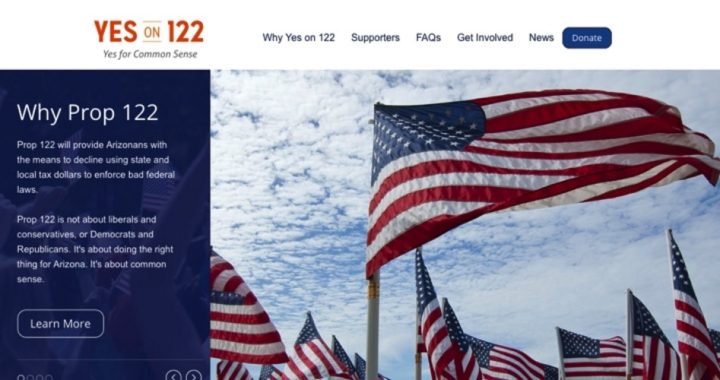
Voters in Arizona will soon be able to manifest the extent of federal overreach they are willing to withstand.
Proposition 122 will appear on the ballot when Arizonans go to the polls on November 4. A website maintained by supporters of the measure explains how the proposed law would work to maintain the correct constitutional boundaries of power:
This constitutional amendment provides a mechanism for the state to recognize a specific federal regulation or law to be an overreach of federal powers. This could be initiated by a 1) ballot measure or 2) vote of the legislature and governor. Upon this determination, the state would withhold state financial resources and personnel from enforcement of such federal action. The federal government would be free to enforce the action with its own personnel (and money) and the state may still pursue relief from the court system.
Any use of this process is limited to areas that comply with the US and Arizona Constitutions (e.g. Arizona could not prevent the national guard from being federalized and could not withhold resources needed to support Brown vs. Board of Education).
The Tenth Amendment Center put a finer point on the issue, writing, “If passed, the state constitutional amendment would make the feds enforce, enact and pay for its unconstitutional actions and programs on their own.”
Should voters approve Proposition 122, it would amend the state constitution to allow Arizona to “exercise its sovereign authority to restrict the actions of its personnel and the use of its financial resources to purposes that are consistent with the Constitution.”
Prop 122 ended up on the general ballot after having been approved last year by the state Senate (16-12) and the state House of Representatives (36-23).
“Politicians in Washington are fond of passing far-reaching laws, but more often than not they depend on state and local governments — and state and local taxpayers — to implement them. This means that not only is Congress making life harder for Arizonans, they’re asking us to pay the bill,” supporters declare on the Yes on 122 website. “That’s why a bipartisan majority of the Arizona Legislature came together to pass Prop 122.”
Liberty is, in fact, a non-partisan issue. It is this sort of recognition of the principle that liberty lifts everyone, not just the monied oligarchy typically enriched by the growth of government.
Proposition 122 also reflects a sound understanding of the Founders’ expectation that the states would serve as sentinels, protecting Americans from autocratic assaults of the federal authority. James Madison explained this principle in The Federalist, No.46:
Should an unwarrantable measure of the federal government be unpopular in particular States, which would seldom fail to be the case, or even a warrantable measure be so, which may sometimes be the case, the means of opposition to it are powerful and at hand. The disquietude of the people; their repugnance and, perhaps, refusal to co-operate with the officers of the Union; the frowns of the executive magistracy of the State; the embarrassments created by legislative devices, which would often be added on such occasions, would oppose, in any State, difficulties not to be despised; would form, in a large State, very serious impediments; and where the sentiments of several adjoining States happened to be in unison, would present obstructions which the federal government would hardly be willing to encounter.
In contemporary legal language, this principle has been called anti-commandeering. The Tenth Amendment Center provides the following brief background on the development of the doctrine.
The amendment language mirrors a well-established legal doctrine. Under the anti-commandeering doctrine, the Supreme Court has consistently held that the federal government cannot force states to help implement or enforce any federal act or program. It rests primarily on four SCOTUS [Supreme Court of the U.S.] cases — Prigg v. Pennsylvania (1842), New York v. US (1992), Printz v. US (1997) and National Federation of Businesses v. Sebelius.
Put simply, anti-commandeering prohibits the federal government from forcing states to participate in any federal program that does not concern “international and interstate matters.”
While this expression of federalism (“dual sovereignty,” as it was named by Justice Antonin Scalia) was first set forth in the case of New York v. United States (1992), most recently it was reaffirmed by the high court in the case of Mack and Printz v. United States (1997).
Writing for the majority, Justice Antonin Scalia explained:
As Madison expressed it: “The local or municipal authorities form distinct and independent portions of the supremacy, no more subject, within their respective spheres, to the general authority than the general authority is subject to them, within its own sphere.” The Federalist No. 39, at 245. [n.11]
This separation of the two spheres is one of the Constitution’s structural protections of liberty. “Just as the separation and independence of the coordinate branches of the Federal Government serve to prevent the accumulation of excessive power in any one branch, a healthy balance of power between the States and the Federal Government will reduce the risk of tyranny and abuse from either front.”
When the federal government assumes powers not explicitly granted to it in the Constitution, it puts the states on the road toward obliteration and citizens on the road to enslavement.
In November, Arizonans will be given the key to breaking the shackles of state subordination by voting yes on Proposition 122.
Should her sister states follow Arizona’s lead, the consolidation of power by the federal government would be curtailed, the “few and defined” powers granted to it in the Constitution would be more fully enforced, and states would be free to exercise the “numerous and indefinite” powers they rightfully retain under the Constitution.
Joe A. Wolverton, II, J.D. is a correspondent for The New American and travels nationwide speaking on nullification, the Second Amendment, the surveillance state, and other constitutional issues. Follow him on Twitter @TNAJoeWolverton and he can be reached at [email protected].



